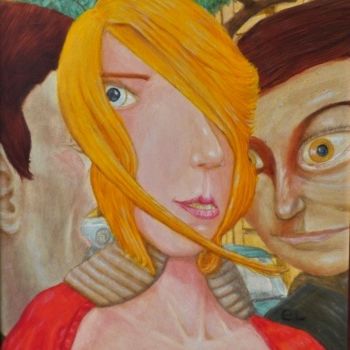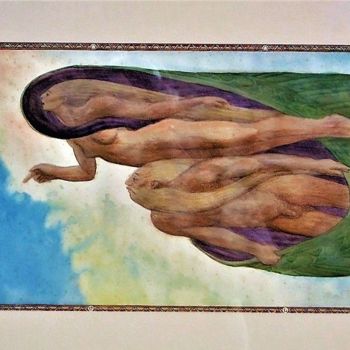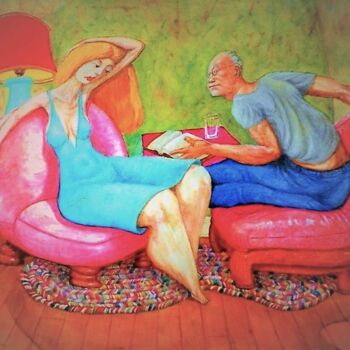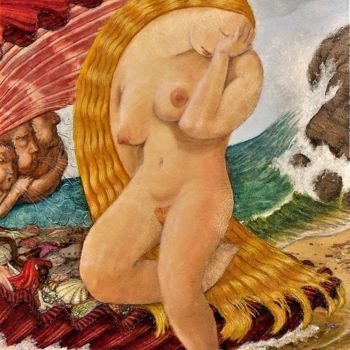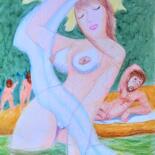Venus Emerges (2022) Dibujo por Edwin Loftus
Más información
- embalaje (Sobre) Todas las obras se envían cuidadosamente protegidas y aseguradas, con un transportista premium.
- Seguimiento Seguimiento del pedido hasta la entrega al comprador. Se proporcionará un número de seguimiento para que pueda seguir el paquete en tiempo real.
- Plazos de tiempo Entrega mundial de 3 a 7 días (Estimar)
Más información
- Certificado de autenticidad online rastreable Los certificados de autenticidad se pueden verificar en línea en cualquier momento escaneando el código de la obra de arte.
- Certificación de la cotización de artista. Los expertos estudian el conjuto de la obra de un artista y su carrera y luego establecen una cotización media independiente y fiable. La cotización media permite situar al artista en una gama de precios durante un período determinado. También se puede solicitar a los expertos que fijen una cotizacion para una obra en particular.
Más información
Pago seguro 100% con certificado SSL + 3D Secure.
Más información
Esta impresión está disponible en varios tamaños.
Vendido por Edwin Loftus
Esta imagen está disponible para descargar con una licencia
Vendido por Edwin Loftus
-
Obra de arte original (One Of A Kind)
Dibujo,
Pastel
en Cartulina
- Dimensiones Altura 14in, Anchura 11in
- Estado de la obra de arte La obra de arte está en perfectas condiciones
- Enmarcado Esta obra de arte no está enmarcada.
- Categorías Dibujos menos de 5.000 US$ Simbolismo
In most ancient civilizations of which we have written records, males were the economic and political center of the family and social order. Views differed greatly from culture to culture, but women, were often viewed as a form of inferior part of humanity, entitled to protection, sometimes with very important rights that verged on superiority in the right settings, but often as possessions of the males with authority over them. Systems equivalent to bride prices and dowries existed around the world.
A bride price, is the sales value of a daughter, usually paid to her father for the right to make her a man's wife. This doesn't mean that a daughter did not have value as a family member and as a person. in fact, for those reasons and her value as a worker in the household and business, fathers, as the controllers of the household, were considered to be owed compensation for the loss they would incur. The family was still likely to take into account the ability of the payee to provide a secure home for their daughter and to treat her humanely. A man of ill-repute might well be turned down, even if he exceeded the bride price asked.
A dowry is the treasure a daughter brings with her as her own possessions and sometimes a sweetener to the exchange of custody. A wealthy daughter's dowry might include large sums of cash and land of economic value. Dowries might be frittered away, but they have often been the property of the wife, protected in case of divorce or inheritance disputes upon the husband's death. A second form of dowry is the 'bride price' a father pays the husband and his family to take on the expense of keeping his daughter. Failure to pay as promised or paying what the family thought too little could place the bride in jeopardy of being cast out or killed.
A third form of bride selling were marriages of alliance. The joining of two families' bloodlines could form a bond of cooperation or non-aggression, the latter particularly of interest to kings and their kinfolk.
In this sort of context and its many variations, romantic interest was expected to result from the marriage, rather than the other way around. And of course, there were many instances of romantic attractions forming between persons other than the person's spouse.
Romantic love was a plus when it occurred between married people, and a bane to social order otherwise, particularly when it led to infidelity and either the production of unwanted children or interfered with the production of heirs. In Europe the rebirth of importance of romantic love began during the Renaissance and into the Enlightenment, generalized through the media of songs, plays, and romantic literature, the mass-media of their day.
Plays like, Romeo and Julliet, were slightly scandalous and very appealing because exposed the alternative and its potential tragedy in a world in which The Taming of the Shrew was just as understandable. Even today, there are countries where bride-selling and dowries that purchase the security of the bride are still practiced and there are those among us that believe couples should be matched based on economic or genetic characteristics. Over the last few decades dozens (or more) movies have been released based on the premise that if someone doesn't get married soon, they'll lose their inheritance. These films are successful because the person they choose as a fake spouse always ends up being their true romantic partner, but the interesting thing is that such stories stand so perfectly with one foot in the pre-romantic era and one foot in the romantic era, and people all over the world accept the premise, because those people are rich and have so much more riding on such things, (no one cares if a pauper or middle-class shop owner's son is denied their inheritance).
A few centuries of infatuation with romance is far from a foundation for an argument that the world has changed. But a few millennia of romantic tales that excite our imaginations and yearnings are an argument for a benefit to be had if and when such a change occurs.
My personal belief is that mutual sexual attraction and mutual romantic attraction are like the two ends of an arrow. The "point" of sexual attraction leads us there and enables us to stick with our target. But the fletching of romantic attraction is what guides us to the right target and the part that remains visible long after the point has done its job.
That is why I have done so many drawings on this subject and tend to mix sex and the potential for love in them. Like Jack and Jill, they'll go up the hill and will either return with a pail of water between them or will come tumbling down.
Temas relacionados
Edwin Loftus es un pintor y dibujante estadounidense nacido en 1951. Su interés por el arte comenzó a los 4 años cuando decidió dibujar algo real en lugar de trabajar desde su imaginación.
De niño destacó en el dibujo y de adolescente comenzó a experimentar con la pintura al óleo. En la universidad, tomó cursos de arte e historia del arte y se dio cuenta de que el verdadero arte no tenía nada que ver con la calidad del dibujo o la pintura, sino que tenía que tener la ambición de traspasar los límites y ampliar la experiencia visual.
También estudió filosofía, psicología e historia y rápidamente se dio cuenta de que era solo otro establecimiento de arte que intentaba defender su industria elitista y su sistema de recompensas. Sus habilidades eran casi inexistentes, no sabían nada sobre psicología, percepción o respuesta a estímulos, y eran extensiones del sistema de creencias que hicieron del comunismo, el fascismo y otras formas de totalitarismo fuerzas tan destructivas en el mundo. Literalmente creen que el arte no debería estar disponible para los seres humanos comunes, sino solo para una élite lo suficientemente "sofisticada" para entenderlo.
Edwin Loftus se dio cuenta de que los emperadores del arte no tenían ropa, pero seguían siendo los emperadores. Dotado en el arte, trabajó duro para adquirir esta habilidad. Así que encontró otras formas de ganarse la vida y vendió algunas obras de arte de vez en cuando. Durante sesenta años, muchas personas disfrutaron de sus obras y algunas las coleccionaron.
Hoy, Edwin Loftus está jubilado. Incluso si vendiera todas sus pinturas por el precio que pidió, "artista" sería el trabajo peor pagado que jamás haya tenido... pero así son las cosas. No le importará después de que muera. Solo espera que a algunas personas les guste lo que hace lo suficiente como para disfrutarlo en el futuro.
-
Nacionalidad:
ESTADOS UNIDOS

- Fecha de nacimiento : 1951
- Dominios artísticos: Obras de artistas con valor de artista certificado,
- Grupos: Artistas certificados Artistas Americanos Contemporáneos




